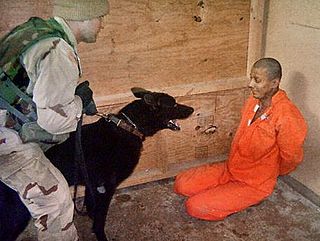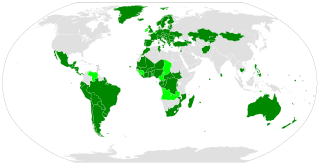
The Convention Against Torture and Other Cruel, Inhuman or Degrading Treatment or Punishment is an international human rights treaty under the review of the United Nations that aims to prevent torture and other acts of cruel, inhuman, or degrading treatment or punishment around the world.

The War Crimes Act of 1996 is a United States federal statute that defines a war crime to include a "grave breach of the Geneva Conventions", specifically noting that "grave breach" should have the meaning defined in any convention to which the United States is a party. The definition of "grave breach" in some of the Geneva Conventions have text that extend additional protections, but all the Conventions share the following text in common: "... committed against persons or property protected by the Convention: willful killing, torture or inhuman treatment, including biological experiments, willfully causing great suffering or serious injury to body or health."
Torture in Bahrain refers to the violation of Bahrain's obligations as a state party to the United Nations Convention against Torture and Other Cruel, Inhuman or Degrading Treatment or Punishment and other international treaties and disregard for the prohibition of torture enshrined in Bahraini law.

Psychological torture or mental torture is a type of torture that relies primarily on psychological effects, and only secondarily on any physical harm inflicted. Although not all psychological torture involves the use of physical violence, there is a continuum between psychological torture and physical torture. The two are often used in conjunction with one another and often overlap in practice, with the fear and pain induced by physical torture often resulting in long-term psychological effects, and many forms of psychological torture involving some form of pain or coercion.

Human rights are largely respected in Switzerland, one of Europe's oldest democracies. Switzerland is often at or near the top in international rankings of civil liberties and political rights observance. Switzerland places human rights at the core of the nation's value system, as represented in its Federal Constitution. As described in its FDFA's Foreign Policy Strategy 2016-2019, the promotion of peace, mutual respect, equality and non-discrimination are central to the country's foreign relations.
The European Committee for the Prevention of Torture and Inhuman or Degrading Treatment or Punishment or shortly Committee for the Prevention of Torture (CPT) is the anti-torture committee of the Council of Europe. Founded to enforce the European Convention for the Prevention of Torture and Inhuman or Degrading Treatment or Punishment, the CPT visits places of imprisonment in signatory countries and issues reports on violations of the convention.

The Inter-American Convention to Prevent and Punish Torture (IACPPT) is an international human rights instrument, created in 1985 within the Western Hemisphere Organization of American States and intended to prevent torture and other similar activities.

The Optional Protocol to the Convention Against Torture and Other Cruel, Inhuman or Degrading Treatment or Punishment is a treaty that supplements to the 1984 United Nations Convention Against Torture. It establishes an international inspection system for places of detention modeled on the system that has existed in Europe since 1987.
The European Convention for the Prevention of Torture and Inhuman or Degrading Treatment or Punishment was adopted by the member states of the Council of Europe, meeting at Strasbourg on 26 November 1987. After the European Convention on Human Rights, the Convention for the Prevention of Torture is widely regarded as being one of the most important of the Council of Europe's treaties. The Convention marks a fresh and preventive approach in handling human rights violations. It was subsequently amended by two Protocols. Additionally, the Committee for the Prevention of Torture was established to comply with the provisions of the convention. This body is enabled to visit any place within the jurisdiction of the states' parties where people are deprived of their liberty in line with the articles of the convention.
In United States law, habeas corpus is a recourse challenging the reasons or conditions of a person's detention under color of law. The Guantanamo Bay detention camp is a United States military prison located within Guantanamo Bay Naval Base. A persistent standard of indefinite detention without trial and incidents of torture led the operations of the Guantanamo Bay detention camp to be challenged internationally as an affront to international, and challenged domestically as a violation of the Due Process Clause of the Fifth and Fourteenth amendments of the United States Constitution, including the right of petition for habeas corpus. In 19 February 2002, Guantanamo detainees petitioned in federal court for a writ of habeas corpus to review the legality of their detention.
The Kharkiv Human Rights Protection Group (KhPG) is one of the oldest and most active Ukrainian human rights organizations. As a legal entity, it was established in 1992, but it has been working as a human rights protection group in the Ukrainian SSR since 1988 under the Society "Memorial". It was the first official human rights organization in the former USSR. Many members of the organization took part in a human rights movement of the 1960s – 1980s.
An atrocity crime is a violation of international criminal law that falls under the historically three legally defined international crimes of genocide, war crimes, and crimes against humanity. Ethnic cleansing is widely regarded as a fourth mass atrocity crime by legal scholars and international non-governmental organizations (NGOs) working in the field, despite not yet being recognized as an independent crime under international law.
The Institute of Therapy and Investigation into the Effects of Torture and State Violence is a multidisciplinary non-governmental organisation based in Bolivia. It offers assistance to those affected directly or indirectly by torture and state violence through rehabilitative means.
The Lexington Principles on the Rights of Detainees is a body of international due process principles that reflect the prevailing transnational norms in the area of detainee treatment. The Lexington Principles were completed and published on April 1, 2009. The instrument consists of 45 principles and countless annotations prepared by the project's law student editorial board. A primary purpose of the drafters of the Lexington Principles was to assist the jurisprudential evolution of American constitutional due process standards after the U.S. Supreme Court's decision in Boumediene v. Bush. While each Principle is based on international law, all provisions have been drafted to facilitate vertical norm internalization into the domestic legal system of the United States and other common law countries.
Prisoners' rights in international law are found in a number of international treaties. For the most part these treaties came into existence following the two World Wars and the body of law continues to be added to and amended.

International Coalition to End Torture is a non-governmental organisation focused on raising awareness of human rights and the United Nations Convention Against Torture around the world by knowing them, demanding them, and defending them. The objective of the organisation is to bring "like-minded individuals from all walks of life, all disciplines, races, creeds and nationalities and allied organizations to bring the full force of unity to bear in the human rights arena.
Prisoners in New Zealand are afforded numerous, but not all, human rights. Criticisms by a United Nations report in 2014 highlighted various issues that constitute ill-treatment of prisoners, such as remand prisoners being routinely held on lock-down for 19 hours per day, an increasingly strict prison regime, and the mixing of adult and youth prisoners.
Immigration detention of refugee and asylum seeking children in Thailand violates the rights of children under international law. The undocumented migrant children are detained for indefinite and prolonged periods without proper access to legal support. Thailand is key transit route, host and final destination for refugees seeking asylum in southeast Asia and Australia. During the Universal Periodic Review (UPR) session in May 2016, various human rights issues including detention of refugee and asylum seeking children were reported. Currently, there are no effective alternatives to immigration detention and all sectors of population including children are subject to detention.
The prohibition of torture is a peremptory norm in public international law—meaning that it is forbidden under all circumstances—as well as being forbidden by international treaties such as the United Nations Convention Against Torture.

The National Commission for the Prevention of Torture (NCPT) is an independent Swiss federal body. It was created by the Federal Council in 2010 following the ratification of the UN Optional Protocol against Torture. Its role is to monitor respect for human rights in Switzerland and to make recommendations to the authorities where necessary. The NCPT is strongly committed to the issues of detention conditions, conditions of deportation of migrants and living conditions in institutions. In addition to its regular reports, the Commission publishes reports on specific topics.







